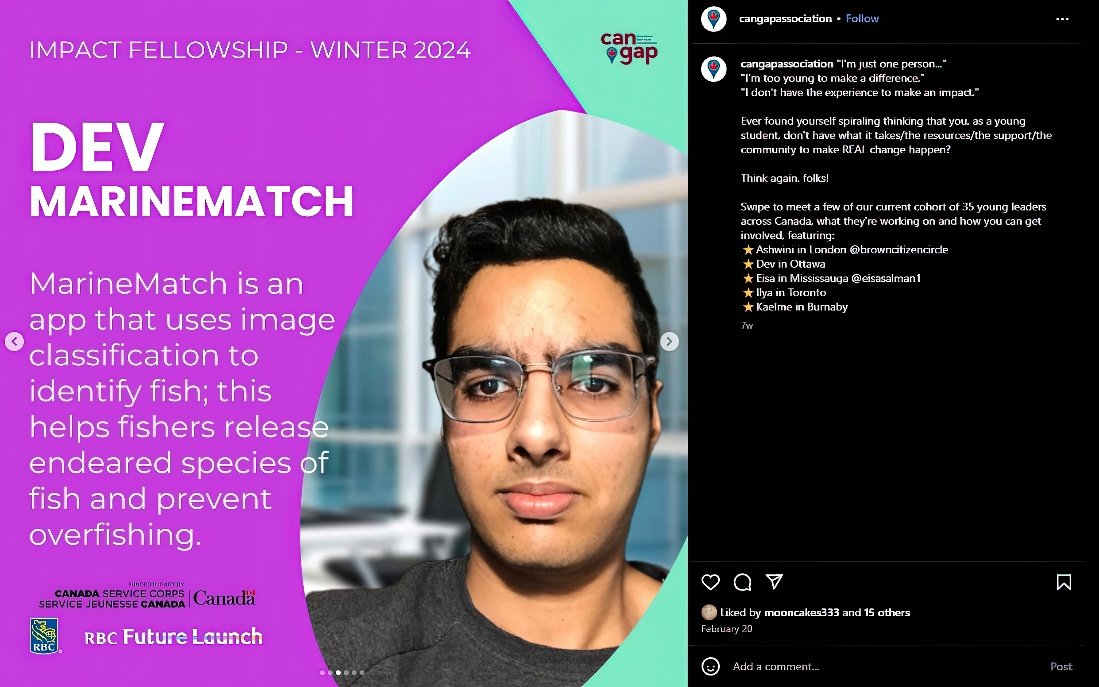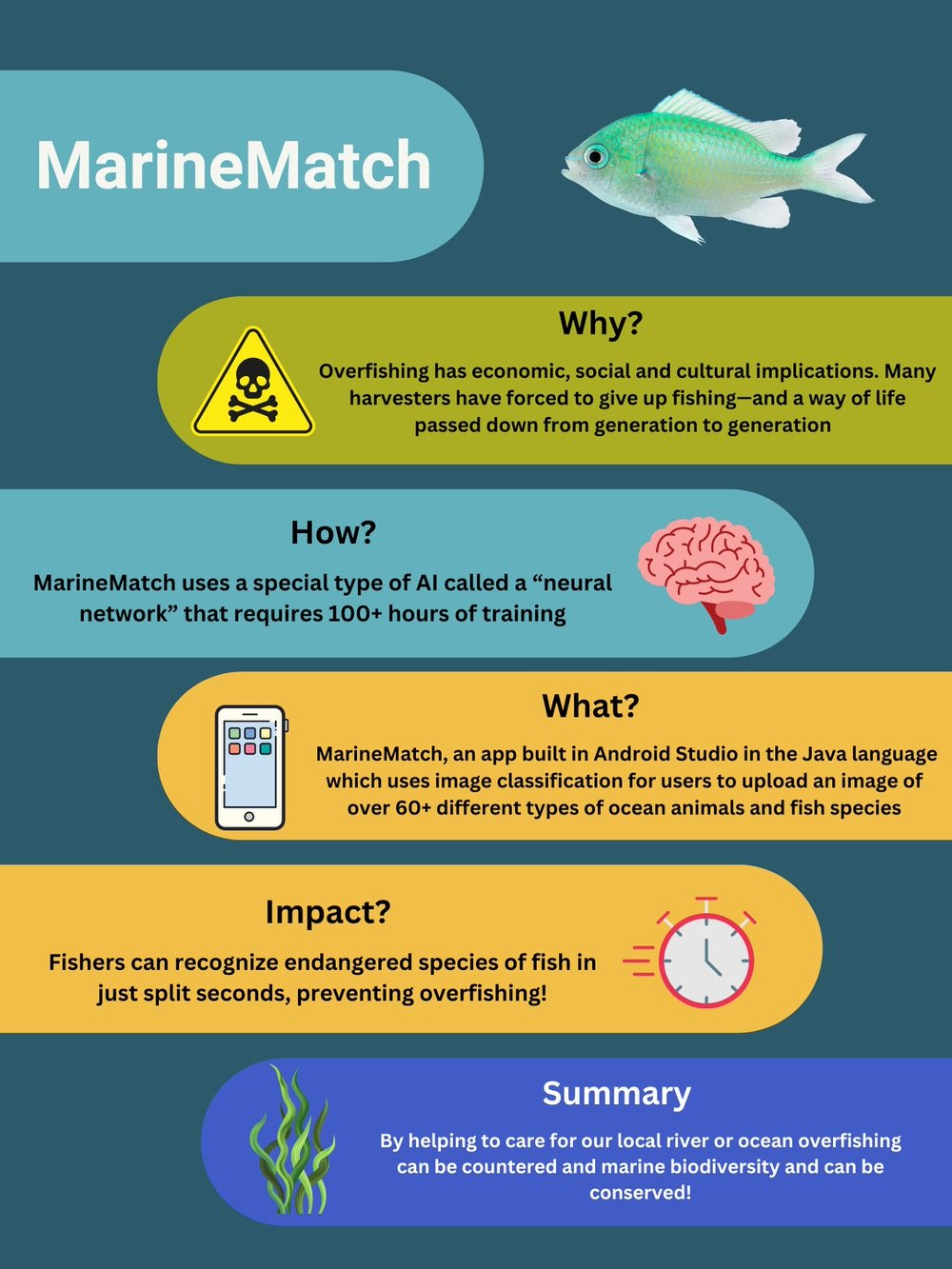Dev Katyal
2024 Youth Climate Activism Award - Essay
Dev Katyal is a 17 year old from Ontario.
MarineMatch: From Overfishing to Ocean Conservation
Overfishing is a huge problem in Canada! This is especially true in coastal and many Indigenous communities. The Newfoundland North Atlantic cod stock was one of the largest fish stocks worldwide. But after years of unregulated fishing, only 1% of this stock remains. This problem goes beyond just economical concerns; fishing is a way of sustenance for Indigenous people, along with a medium in which culture is passed down. Stripping away fish from Indigenous communities is compromising their food sovereignty, not to mention the devastating impacts on the ecosystem.
Surprisingly, overfishing is not always intentional; new fishers often mistake endangered species for accepted catch, or perhaps are unable to recognize the species and decide to keep it. This motivated me to create MarineMatch, an app built in Android Studio in the Java language which uses image classification for users to identify 60+ different types of ocean animals and fish species. This was possible through a TensorFlow Lite deep-learning model with 100+ hours of training! The app classifies the image via an image recognition algorithm from the convolutional neural network, determining the species of the ocean creature and displaying it from the user - all within just split seconds. MarineMatch makes sure there is no excuse for irresponsible practices; fishers can easily identify the species of the fish and make responsible decisions!
Through this project, 10 local fishers have already been able to contribute to sustainable fishing practices; being able to make informed decisions on whether to catch or release fish – maintaining the biodiversity of Canadian waters.
MarineMatch has gone beyond the scope of my own community, connecting with OceanWise through their Youth to Sea program and Earth Rangers through their ER Teen program. Hundreds of youth across Canada have heard of this movement through social media and even through my in-person presentation at the Ontario Science and Technology Museum. I was even able to receive a $1500 grant through the OceanWise organization to fund this project. With 5 new downloads each day, MarineMatch is slowly spreading and making Canadian's aware that overfishing is a problem we all must fight together.
Follow MarineMatch on Instagram
Beyond MarineMatch, I continue to express my passion for environmental conservation by volunteering with nonprofits and presenting Canada on both a local and national level. In terms of my previous experience with environmental conservation, I have been a part of Sustainable Youth Canada, CWF Wild Outside Program, Earth Rangers ER Teen program and the Ontario Nature Youth Council for 2+ years.
In fact, I even attended the 2023 Youth Summit for Mother Earth. In total, I have over 500+ service hours just from environmental workshops and in-person cleanups. Most recently, I was also selected to be 1 of 25 Marine Plastic Ambassadors representing North America, traveling internationally to attend workshops related to plastic pollution.
Some people are very artistic, while others can build cool software using coding, all these strengths can be harnessed - giving hundreds of youth the chance to get involved and build a brighter Canada.
As part of the submissions application we asked participants to answer these 3 questions in addition to their essay or video.
What future goals do you have around your environmental and climate work, and do you have any future projects in mind?
My long-term objective is to continue expressing my passion by using computer science to build stronger communities in Canada, this includes goals to build an app that can can track greenhouse gas concentrations from publicly available satellite data. I want to use tech as a tool to promote environmental conservation in Canada.
Beyond this, I hope to inspire as many young Canadian youth as possible, expressing my passion through connecting with organizations like Canada Learning Code and giving many children their first experience with STEM. Through this youth engagement, I also hope to continue collaborating with organizations such as OceanWise and the Canadian Wildlife Federation to organize workshops for young people ad give them ways to launch their ocean service project related to the environment.
With a bit of research and dedication, youth are able to leave a huge impact and connect people all across Canada, unified under the vision to build a more sustainable Canada.
If you could share with us one message of hope for our planet, what would it be?
Most people, including myself, were surprised that despite living hundreds of kilometres from the ocean, their community could also be impacted. Most importantly, I learned that tech can be a tool to fight for meaningful social and environmental justice; bringing light to the underrepresented Indigenous voices and communities that are impacted by overfishing.
Most importantly, I learned I need to push myself to break my boundaries; my project could have just been a great idea that only I knew about. To further conserve our oceans, I encourage all people to launch their own service project in their community. This could come in the form of an ocean-cleanup, an educational kit that teaches youth about ocean species, a public speaking event or even a piece of artwork. My project MarineMatch started off as a crazy idea in my head, but hundreds of people have heard about it just by having the courage to start and share my perspective of the ocean.
With more youth and adults volunteering and learning about problems such as overfishing, we are on the correct route to advocating for climate change and using innovative as a catalyst for environmental conservation.
Who or what inspires you to work on climate change?
Despite having one of the most regulated fisheries in the world, Canada has not been immune to the effects of overfishing. The collapse of the Atlantic Canadian cod fishery in the 1990s is one of the most commonly cited examples in the world of overfishing and its economic, social and cultural implications. Many people are surprised to learn that fewer than one-third of Canada's fisheries are considered healthy, and overfishing is a major culprit.
This is what inspired me to launch my own service project called MarineMatch.







